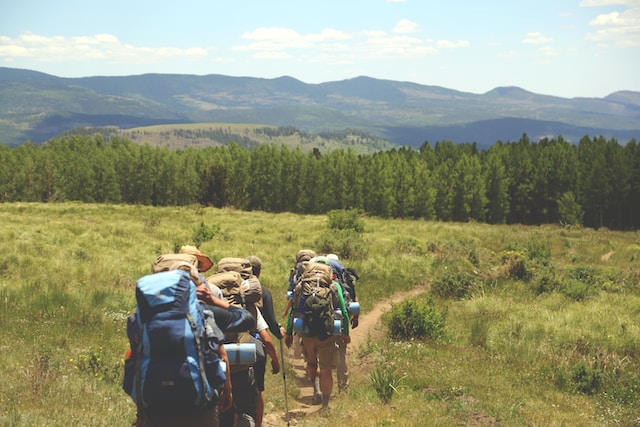Imagine taking a medication that will strengthen your glutes, improve mental clarity and function, and reduce your chances of heart attacks, strokes, diabetes, cancer, and other illnesses.
For all of that, how much would you pay? You may purchase it for the cost of a hiking boot and the odd blister. Hiking, whether it be a leisurely stroll in an urban green space or scaling steep peaks in a distant wilderness, is increasingly being recognized as the solution to the psychological and physical health issues brought on by a modern lifestyle that is high on screens and low on exercise.
Trekking to Improve Your Physical Well-Being
Hiking has several remarkable physical benefits, similar to other weight-bearing workouts. These benefits include increased bone density and protection against age-related diseases including osteoporosis and arthritis. It also helps prevent diabetes, lowers the risk of heart disease, and raises blood pressure.
However, as scientists leave the lab, they are discovering that hiking has advantages that are incomparable to those of using a treadmill. Some of the most notable advantages stem from the necessity of overcoming the kinds of physical challenges that aren’t present in a gym. Consider it traditional cross-training. Gaining altitude causes your body to work harder, which promotes even greater weight loss, and climbing hills helps you burn more calories than using a treadmill.
Hiking is more physically demanding than walking on level pavement since it frequently involves uneven terrain and lots of ups and downs, especially if you are carrying a backpack. In addition to enhancing balance, which deteriorates with age and raises the possibility of falls—which rank among the leading causes of harm and death for adults over 65—the uneven terrain also helps prevent falls.
The Advantages of Hiking for Mental Health
Even if hiking has many physical advantages, its psychological benefits might be even more significant in this day and age of rising worry and sadness. A 2015 Stanford Woods Institute for the Environment study discovered evidence linking walks in natural settings to a decreased incidence of depression.
The study, which was published in the National Academy of Science, discovered that individuals who walked for 90 minutes in a natural setting had significantly less activity in a brain region that is active during rumination, or repeated thought concentrated on unpleasant feelings, than individuals who walked for the same length of time in a busy area.
Both groups received brain scans and questionnaires after their treks. The physiological advantages were largely similar for all the groups, but there were significant differences in their mental well-being.
Stanford psychology professor James Gross, one of the authors, stated that the results are significant because they support the notion that being in nature improves our mood. This is especially important now that a growing number of people live in cities and spend less time outside experiencing nature.
Similarly, longer and more frequent hikes are linked to fewer signs of depression in a study of individuals who were at an increased risk of suicide. This was discovered in a 2012 study on the long-term consequences of hiking, where participants spent four days on the trails.
Hiking and other outdoor activities benefit not only mental wellness but also cognitive performance. Researchers have discovered that people who spend more time outside have higher levels of creativity, problem solving, and general cognitive function. This supports the theory that, despite all the advantages and multitasking capabilities that technology provides, it is a good idea to periodically disconnect and give your brain a chance to reset in the presence of nature.
Building Healthy Relationships Through Hiking
While many people are aware of the advantages hiking and outdoor activities have for their physical and mental health, another benefit that is rapidly gaining attention is the impact hiking has on relationships.
Although hiking is often associated with solitude, it’s actually a fantastic method to build relationships in a wide range of contexts, particularly when done in groups. According to a study that was written up in the Journal of Anthropology and Medicine, Norwegian families who went on walks in the forest together were able to develop a new kind of existence that was more centered on “the here and now.”
The results went beyond the conventional wisdom that nature is healthy and excessive social interaction is detrimental. Instead, it was discovered that families might shut out the outside world in order to concentrate on fortifying their fundamental bonds and benefiting from one another’s experiences.
Hiking in pairs or groups promotes healthy levels of encouragement, patience, good communication, and helping one another get over obstacles. These benefits are in addition to the health benefits already mentioned. I believe many people would agree that hiking with a partner or in a group is preferable to attending a couple’s retreat.
What is the ultimate conclusion of hiking, then? In Our National Parks, John Muir stated, “Nature’s peace will flow into you as sunshine flows into trees,” which, in my opinion, is a great way to put it. Cares will fall from you like autumn leaves, and the winds will blow their own freshness and the storms their force. Thus, pay attention to your mother, get off the screen, and walk outside. You’ll experience a multitude of positive changes.





Provided many precautions, very thoughtful.
Yes, hiking can exercise my body and make me more energetic.
These suggestions make travel easier.
The recommended tourist attractions in the article are very good.
Provides many cost-effective travel tips.
The article is practical and a must read for those who enjoy traveling alone.
For people who enjoy traveling, it is a good article.